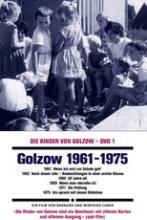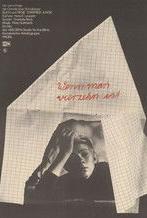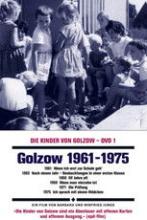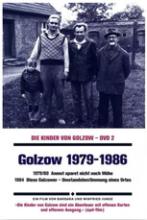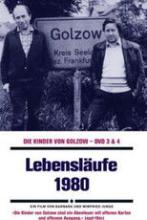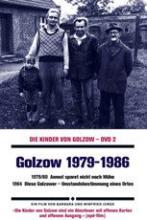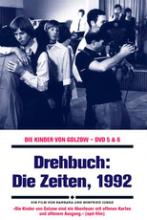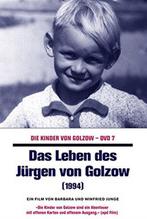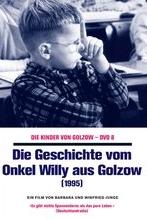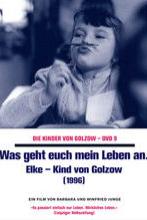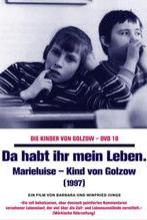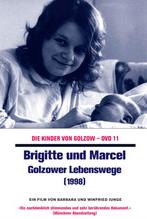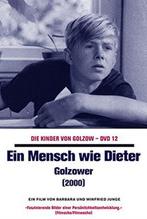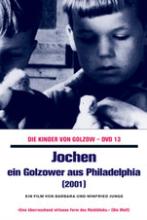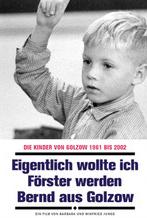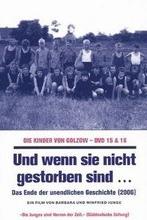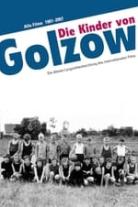
The Children of Golzow
The Children of Golzow is a documentary by the German filmmaker Winfried Junge that was started in 1961 and lasted until 2007, when the series concluded. The film is a prolonged observation of the lives of several people in the Brandenburg town of Golzow.
Wenn ich erst zur Schule geh (1962)
19 April, 1962
The children of Golzow, six or seven years old, in kindergarten. Their enrollment in school together, the first days of school. Playfully learning the first letter. Conflicts between wanting and having to.
Nach einem Jahr - Beobachtungen in einer ersten Klasse (1963)
08 March, 1963
How the class community is formed. The children's environment and the experiences and discoveries that the school gives them. They are reflected in the lessons. At the end of the school year they receive their first report card and are "Young Pioneers".
Elf Jahre alt (1966)
01 September, 1966
The age group in a group portrait of the fifth grade. They make suggestions for filming at school, in their free time and at home. Growing challenges through the lessons that bring knowledge and new questions and broaden their horizons.
Wenn man vierzehn ist (1970)
06 March, 1970
They are now no longer children. Young citizens distinguish themselves. The time before the Jugendweihe and its celebration. They visit Weimar, the former Sachsenhausen concentration camp, the Schwedt petrochemical combine, and decide to go into business after the eighth grade, stay until the tenth, or take the Abitur in the district town.
Die Prüfung (1972)
03 March, 1972
The final exam of sixteen and seventeen year olds at the end of the 10th grade. The individual in the minutes in which he is supposed to show what he can do and who he is. A last class party before the community ends and one goes apart.
Ich sprach mit einem Mädchen (1976)
13 February, 1976
A class reunion of the twenty-somethings in the old school. What one remembers, what the individual has new to tell. One of them: Marieluise. Her love, her work, her demands on herself and the world into which she is coming of age.
Anmut sparet nicht noch Mühe (1980)
23 March, 1980
The first summarizing film about the path of the class and the common stations in life. But also about the different paths in the profession, in love, marriage and family. As well as a soldier. A group chronicle, viewed from the historical distance of the 35th year of the end of the 2nd World War and after 18 years of shooting in peace, which ensured everyone the first human right: they were allowed to live.
Lebensläufe - Die Geschichte der Kinder von Golzow in einzelnen Portraits (1981)
13 October, 1981
A sequence of nine individual biographical sketches with a prologue and epilogue on Golzow and the long-term observation. Deepening of the preceding chronicle. The Golzow people in the present, from which retrospective views of the previous life and the life conflicts of the individual are given.
Diese Golzower - Umstandsbestimmung eines Ortes (1984)
26 September, 1984
Around the festival week for the 675th anniversary of Golzow for GDR television a portrait of the village, its landscape and agriculture in the past and present. In sketches also the parents' generation and the current state of affairs in the lives of some of our "children of Golzow".
Drehbuch - Die Zeiten (1993)
14 February, 1993
The first cinematic review after the fall of the Wall and the end of the GDR. In the context of a reunion of the "children of Golzow" on the 1st anniversary of German unity and their joint trip to Hamburg also a workshop report documenting the thirty-year history of the Golzow Chronicle from the new German situation as well as the thoughts and feelings, hopes, fears and objective changes in the lives of now already 13 portrayed.
Das Leben des Jürgen von Golzow (1994)
19 February, 1994
The first life story of one of the "children of Golzow", continued beyond the "Wende" as an independent feature-length film, which tells of the career of the first hero of our first film, using the rich material available from Jürgen, who became a painter and upholsterer, and "his" Golzow, where he still lived at the time.
Die Geschichte vom Onkel Willy aus Golzow (1996)
18 February, 1996
Subsequent discovery of one of the students from the class, to whom in "Curricula vitae" was not yet dedicated a portrait sketch. What the smallest in the class knew how to make of himself. Why the agricultural machinist and father of two sons from his first marriage is called uncle by his third son.
Was geht euch mein Leben an - Elke, Kind von Golzow (1997)
22 May, 1997
The different life paths of former girlfriends from Catholic and Protestant homes respectively - one a draftswoman, the other a chemical laboratory technician - in two interrelated films, in which love, like the demands and attitudes to life in the change of its foundations in the process of the decline of the GDR and its accession to the Federal Republic of Germany, play a special role.
Da habt ihr mein Leben - Marieluise, Kind von Golzow (1997)
16 February, 1997
The different life paths of former girlfriends from Catholic and Protestant homes respectively - one a draftswoman, the other a chemical laboratory technician - in two interrelated films, in which love, like the demands and attitudes to life in the change of its foundations in the process of the decline of the GDR and its accession to the Federal Republic of Germany, play a special role.
Brigitte und Marcel - Golzower Lebenswege (1999)
18 February, 1999
The tragic story of a fun-loving schoolgirl who was the first in her class to become a mother at seventeen, remained unmarried for a long time, worked as a poultry farmer and died of heart failure at the age of 29. It is also the story of her son, who after his apprenticeship in Golzow was unable to find work as a factory fitter and who is also the father of a disabled child.
Ein Mensch wie Dieter - Golzower (2000)
13 February, 2000
The portrait of someone who came into the class as a dropout and, as far as travel is concerned, later went the farthest of all. The career of a carpenter, enterprising go-getter and incorrigible optimist who always made the best of the changing situations in his life.
Jochen - Ein Golzower aus Philadelphia (2002)
14 February, 2002
About the son of an agricultural functionary who helped enforce the socialist order in Philadelphia in Brandenburg, then in Golzow (Oderbruch) and finally in Bernau near Berlin. Jochen therefore went to school in Golzow for only one year. He became a milker, was a border guard, married and lives with three children in Bernau. Just as disappointed with the GDR as he was with its fall, today he is even with all politics.
Eigentlich wollte ich Förster werden - Bernd aus Golzow (2003)
07 February, 2003
Bernhard Oestreich, called Bernd, son of one of the leaders of the Golzow LPG, did not stay in the countryside, but also turned down the opportunity to graduate from high school in order to study. He should have become a professional soldier. Married with two daughters, Bernd went into big industry, became a laborer and is still as needed today as a foreman at Raffinerie AG Schwedt (Oder) as he once was at VEB Petrolchemisches Kombinat in the days of the GDR. Much has changed in his life, but what has remained is the work in three shifts.
Und wenn sie nicht gestorben sind... Die Kinder von Golzow - Das Ende der unendlichen Geschichte (2006)
11 February, 2006
The first two parts of the 19th film are about five former pupils. Two of them already made themselves known through the "CVs" of 1980: Ilona, the electronics worker and later youth functionary in Frankfurt (Oder), and Winfried, the graduate engineer for electronic device construction, who was then also commander of the combat group of his company, the Gröditz (Saxony) pulp mill, and now lives temporarily unemployed in Augsburg. In addition to Ilona and Winfried, who were politically active, the new film portrays Jürgen, Petra and Christian. Their cinematic lives are shorter, because the documentarians had long lost track of them. Now, over 50 years old, Jürgen, initially trained as a painter and upholsterer and now a transport and warehouse worker in Manschnow (Oderbruch), and Christian, an agricultural machinery fitter and now an in-house technician at the Kreditanstalt für Wiederaufbau in Berlin, were willing to be filmed once again.
... dann leben sie noch heute - Die Kinder von Golzow (2008)
16 February, 2008
The unemployed businesswoman Elke in Golzow, the geriatric nurse Karin in Wuppertal, the first teacher of the class, Marlies Teike, and Gudrun, the former mayor of Genschmar, as well as their father, the long-time LPG chairman of Golzow. In the fourth part of the irrevocably last film about the children of Golzow: the agricultural machine fitters Bernhard and Eckhard and Dr. Manfred Großkopf, managing director of the Landwirtschafts-GmbH Golzow, which emerged from the LPG. His epilogue recalls once again a reunion of some of the former pupils at the kindergarten's Buddelkasten on the eve of the 1st anniversary of German reunification. Accompanied by a song from the Golzow school, which wants to call itself "School of the Children of Golzow" in the future, the camera leaves the village and reaches the Oder River with aerial shots, which flows through the wide plain of the fracture towards the sea.

